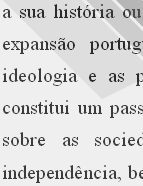

................................
Entangled in the web of the Estado Novo's ideological and political legitimations, the Portuguese writing of history limited itself to rejecting the exclusiveness of the religious justification for colonisation, acknowledging the importance of the economic factor in the relations between the Portuguese and Africans, but continuing to reject the ideological support of racism (Oliveira Marques, História de Portugal [1972],1986, II, 532).
The history of «Portuguese Africa» or the rejection of African historical autonomy
While the international historiography of the 1960s established lines of reflection and analyses capable of rigorously defining the historical dynamics of dominated societies, Portuguese historiography translated itself into the writing and dissemination of unproblematic histories, the sole objective of which was to reassure the choices of the powers that be, rejecting uncomfortable texts, authors and facts: both Marcelo Caetano (1951) and Silva Rego (1956-1957) centred their concerns around the idea of the "continuity" of Portuguese colonisation, characterised by a "colonial vocation", which had remained unshakeable throughout five centuries of a riftless history, marked by relations with other peoples. In the twentieth century colonial framework, these were now the Africans, who guaranteed the true dimension of Portuguese imperial exceptionality, "Africa [being] the only one of the colonisable continents where Portugal as a sovereign nation [held] (...) important interests as well as (...) promises of future prosperity" (Batalha Reis, Estudos Geográficos e Históricos [Geographical and Historical Studies], 1941, 87).
The racial inferiority of the Africans, their quasi-animalisation, so scientifically proven by 19th century science and also by the "well-known (...) horror of the negro for work" (Silva Rego, História da Colonização Moderna [History of Modern Colonisation], 1956-1957, 203), allowed the history of Africa to be concealed, stripped of any form of intellectuality, as Hegel, Silva Cunha's direct or indirect master, and so many other strongmen of the Salazar regime, had already done. Historical knowledge relating to Africa thus became a segment of Portuguese history, with Africans being used only to assert the courage or intelligence of the Portuguese.
While the concept of a "Portuguese Africa" guided the organisation of national historiography, concentrating the various African realities in a single, homogenous space, centred around the Portuguese, for the sake of the colonising operability, it was often obliged to break this historical-spatial unity and to produce monographic studies.
